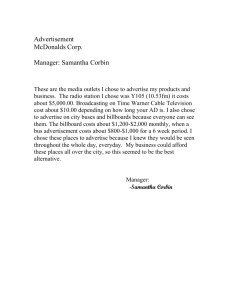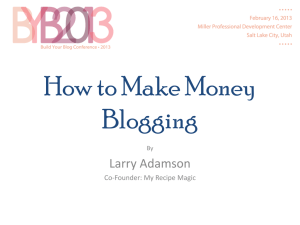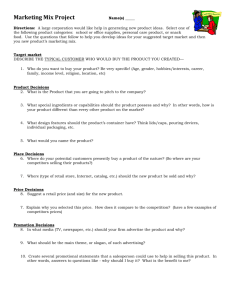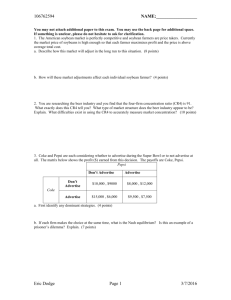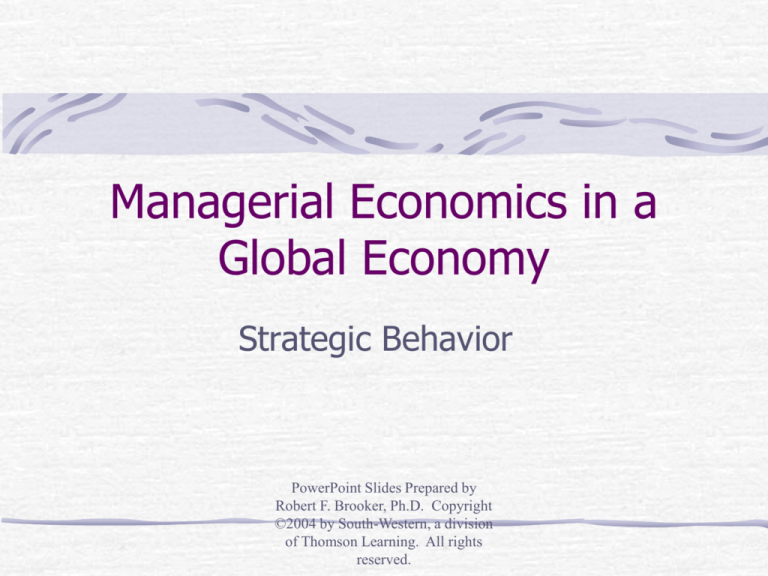
Managerial Economics in a
Global Economy
Strategic Behavior
PowerPoint Slides Prepared by
Robert F. Brooker, Ph.D. Copyright
©2004 by South-Western, a division
of Thomson Learning. All rights
reserved.
Strategic Behavior
Game Theory
Players
Strategies
Payoff matrix
Nash Equilibrium
Each player chooses a strategy that is
optimal given the strategy of the other
player
A strategy is PowerPoint
dominant
if it is always optimal
Slides Prepared by
Robert F. Brooker, Ph.D. Copyright
©2004 by South-Western, a division
of Thomson Learning. All rights
reserved.
Game Theory
Advertising Example
Firm A
Advertise
Don't Advertise
Firm B
Advertise
Don't Advertise
(4, 3)
(5, 1)
(2, 5)
(3, 2)
PowerPoint Slides Prepared by
Robert F. Brooker, Ph.D. Copyright
©2004 by South-Western, a division
of Thomson Learning. All rights
reserved.
Game Theory
What is the optimal strategy for Firm A if Firm B chooses to
advertise?
Firm A
Advertise
Don't Advertise
Firm B
Advertise
Don't Advertise
(4, 3)
(5, 1)
(2, 5)
(3, 2)
PowerPoint Slides Prepared by
Robert F. Brooker, Ph.D. Copyright
©2004 by South-Western, a division
of Thomson Learning. All rights
reserved.
Game Theory
What is the optimal strategy for Firm A if Firm B chooses to
advertise?
If Firm A chooses to advertise, the payoff is 4. Otherwise,
the payoff is 2. The optimal strategy is to advertise.
Firm A
Advertise
Don't Advertise
Firm B
Advertise
Don't Advertise
(4, 3)
(5, 1)
(2, 5)
(3, 2)
PowerPoint Slides Prepared by
Robert F. Brooker, Ph.D. Copyright
©2004 by South-Western, a division
of Thomson Learning. All rights
reserved.
Game Theory
What is the optimal strategy for Firm A if Firm B chooses
not to advertise?
Firm A
Advertise
Don't Advertise
Firm B
Advertise
Don't Advertise
(4, 3)
(5, 1)
(2, 5)
(3, 2)
PowerPoint Slides Prepared by
Robert F. Brooker, Ph.D. Copyright
©2004 by South-Western, a division
of Thomson Learning. All rights
reserved.
Game Theory
What is the optimal strategy for Firm A if Firm B chooses
not to advertise?
If Firm A chooses to advertise, the payoff is 5. Otherwise,
the payoff is 3. Again, the optimal strategy is to advertise.
Firm A
Advertise
Don't Advertise
Firm B
Advertise
Don't Advertise
(4, 3)
(5, 1)
(2, 5)
(3, 2)
PowerPoint Slides Prepared by
Robert F. Brooker, Ph.D. Copyright
©2004 by South-Western, a division
of Thomson Learning. All rights
reserved.
Game Theory
Regardless of what Firm B decides to do, the optimal
strategy for Firm A is to advertise. The dominant strategy
for Firm A is to advertise.
Firm A
Advertise
Don't Advertise
Firm B
Advertise
Don't Advertise
(4, 3)
(5, 1)
(2, 5)
(3, 2)
PowerPoint Slides Prepared by
Robert F. Brooker, Ph.D. Copyright
©2004 by South-Western, a division
of Thomson Learning. All rights
reserved.
Game Theory
What is the optimal strategy for Firm B if Firm A chooses to
advertise?
Firm A
Advertise
Don't Advertise
Firm B
Advertise
Don't Advertise
(4, 3)
(5, 1)
(2, 5)
(3, 2)
PowerPoint Slides Prepared by
Robert F. Brooker, Ph.D. Copyright
©2004 by South-Western, a division
of Thomson Learning. All rights
reserved.
Game Theory
What is the optimal strategy for Firm B if Firm A chooses to
advertise?
If Firm B chooses to advertise, the payoff is 3. Otherwise,
the payoff is 1. The optimal strategy is to advertise.
Firm A
Advertise
Don't Advertise
Firm B
Advertise
Don't Advertise
(4, 3)
(5, 1)
(2, 5)
(3, 2)
PowerPoint Slides Prepared by
Robert F. Brooker, Ph.D. Copyright
©2004 by South-Western, a division
of Thomson Learning. All rights
reserved.
Game Theory
What is the optimal strategy for Firm B if Firm A chooses
not to advertise?
Firm A
Advertise
Don't Advertise
Firm B
Advertise
Don't Advertise
(4, 3)
(5, 1)
(2, 5)
(3, 2)
PowerPoint Slides Prepared by
Robert F. Brooker, Ph.D. Copyright
©2004 by South-Western, a division
of Thomson Learning. All rights
reserved.
Game Theory
What is the optimal strategy for Firm B if Firm A chooses
not to advertise?
If Firm B chooses to advertise, the payoff is 5. Otherwise,
the payoff is 2. Again, the optimal strategy is to advertise.
Firm A
Advertise
Don't Advertise
Firm B
Advertise
Don't Advertise
(4, 3)
(5, 1)
(2, 5)
(3, 2)
PowerPoint Slides Prepared by
Robert F. Brooker, Ph.D. Copyright
©2004 by South-Western, a division
of Thomson Learning. All rights
reserved.
Game Theory
Regardless of what Firm A decides to do, the optimal
strategy for Firm B is to advertise. The dominant strategy
for Firm B is to advertise.
Firm A
Advertise
Don't Advertise
Firm B
Advertise
Don't Advertise
(4, 3)
(5, 1)
(2, 5)
(3, 2)
PowerPoint Slides Prepared by
Robert F. Brooker, Ph.D. Copyright
©2004 by South-Western, a division
of Thomson Learning. All rights
reserved.
Game Theory
The dominant strategy for Firm A is to advertise and the
dominant strategy for Firm B is to advertise. The Nash
equilibrium is for both firms to advertise.
Firm A
Advertise
Don't Advertise
Firm B
Advertise
Don't Advertise
(4, 3)
(5, 1)
(2, 5)
(3, 2)
PowerPoint Slides Prepared by
Robert F. Brooker, Ph.D. Copyright
©2004 by South-Western, a division
of Thomson Learning. All rights
reserved.
Game Theory
A Second Advertising Example
Firm A
Advertise
Don't Advertise
Firm B
Advertise
Don't Advertise
(4, 3)
(5, 1)
(2, 5)
(6, 2)
PowerPoint Slides Prepared by
Robert F. Brooker, Ph.D. Copyright
©2004 by South-Western, a division
of Thomson Learning. All rights
reserved.
Game Theory
What is the optimal strategy for Firm A if Firm B chooses to
advertise?
Firm A
Advertise
Don't Advertise
Firm B
Advertise
Don't Advertise
(4, 3)
(5, 1)
(2, 5)
(6, 2)
PowerPoint Slides Prepared by
Robert F. Brooker, Ph.D. Copyright
©2004 by South-Western, a division
of Thomson Learning. All rights
reserved.
Game Theory
What is the optimal strategy for Firm A if Firm B chooses to
advertise?
If Firm A chooses to advertise, the payoff is 4. Otherwise,
the payoff is 2. The optimal strategy is to advertise.
Firm A
Advertise
Don't Advertise
Firm B
Advertise
Don't Advertise
(4, 3)
(5, 1)
(2, 5)
(6, 2)
PowerPoint Slides Prepared by
Robert F. Brooker, Ph.D. Copyright
©2004 by South-Western, a division
of Thomson Learning. All rights
reserved.
Game Theory
What is the optimal strategy for Firm A if Firm B chooses
not to advertise?
Firm A
Advertise
Don't Advertise
Firm B
Advertise
Don't Advertise
(4, 3)
(5, 1)
(2, 5)
(6, 2)
PowerPoint Slides Prepared by
Robert F. Brooker, Ph.D. Copyright
©2004 by South-Western, a division
of Thomson Learning. All rights
reserved.
Game Theory
What is the optimal strategy for Firm A if Firm B chooses
not to advertise?
If Firm A chooses to advertise, the payoff is 5. Otherwise,
the payoff is 6. In this case, the optimal strategy is not to
advertise.
Firm A
Advertise
Don't Advertise
Firm B
Advertise
Don't Advertise
(4, 3)
(5, 1)
(2, 5)
(6, 2)
PowerPoint Slides Prepared by
Robert F. Brooker, Ph.D. Copyright
©2004 by South-Western, a division
of Thomson Learning. All rights
reserved.
Game Theory
The optimal strategy for Firm A depends on which strategy
is chosen by Firms B. Firm A does not have a dominant
strategy.
Firm A
Advertise
Don't Advertise
Firm B
Advertise
Don't Advertise
(4, 3)
(5, 1)
(2, 5)
(6, 2)
PowerPoint Slides Prepared by
Robert F. Brooker, Ph.D. Copyright
©2004 by South-Western, a division
of Thomson Learning. All rights
reserved.
Game Theory
What is the optimal strategy for Firm B if Firm A chooses to
advertise?
Firm A
Advertise
Don't Advertise
Firm B
Advertise
Don't Advertise
(4, 3)
(5, 1)
(2, 5)
(6, 2)
PowerPoint Slides Prepared by
Robert F. Brooker, Ph.D. Copyright
©2004 by South-Western, a division
of Thomson Learning. All rights
reserved.
Game Theory
What is the optimal strategy for Firm B if Firm A chooses to
advertise?
If Firm B chooses to advertise, the payoff is 3. Otherwise,
the payoff is 1. The optimal strategy is to advertise.
Firm A
Advertise
Don't Advertise
Firm B
Advertise
Don't Advertise
(4, 3)
(5, 1)
(2, 5)
(6, 2)
PowerPoint Slides Prepared by
Robert F. Brooker, Ph.D. Copyright
©2004 by South-Western, a division
of Thomson Learning. All rights
reserved.
Game Theory
What is the optimal strategy for Firm B if Firm A chooses
not to advertise?
Firm A
Advertise
Don't Advertise
Firm B
Advertise
Don't Advertise
(4, 3)
(5, 1)
(2, 5)
(6, 2)
PowerPoint Slides Prepared by
Robert F. Brooker, Ph.D. Copyright
©2004 by South-Western, a division
of Thomson Learning. All rights
reserved.
Game Theory
What is the optimal strategy for Firm B if Firm A chooses
not to advertise?
If Firm B chooses to advertise, the payoff is 5. Otherwise,
the payoff is 2. Again, the optimal strategy is to advertise.
Firm A
Advertise
Don't Advertise
Firm B
Advertise
Don't Advertise
(4, 3)
(5, 1)
(2, 5)
(6, 2)
PowerPoint Slides Prepared by
Robert F. Brooker, Ph.D. Copyright
©2004 by South-Western, a division
of Thomson Learning. All rights
reserved.
Game Theory
Regardless of what Firm A decides to do, the optimal
strategy for Firm B is to advertise. The dominant strategy
for Firm B is to advertise.
Firm A
Advertise
Don't Advertise
Firm B
Advertise
Don't Advertise
(4, 3)
(5, 1)
(2, 5)
(6, 2)
PowerPoint Slides Prepared by
Robert F. Brooker, Ph.D. Copyright
©2004 by South-Western, a division
of Thomson Learning. All rights
reserved.
Game Theory
The dominant strategy for Firm B is to advertise. If Firm B
chooses to advertise, then the optimal strategy for Firm A
is to advertise. The Nash equilibrium is for both firms to
advertise.
Firm A
Advertise
Don't Advertise
Firm B
Advertise
Don't Advertise
(4, 3)
(5, 1)
(2, 5)
(3, 2)
PowerPoint Slides Prepared by
Robert F. Brooker, Ph.D. Copyright
©2004 by South-Western, a division
of Thomson Learning. All rights
reserved.
Prisoners’ Dilemma
Two suspects are arrested for armed robbery. They are
immediately separated. If convicted, they will get a term
of 10 years in prison. However, the evidence is not
sufficient to convict them of more than the crime of
possessing stolen goods, which carries a sentence of
only 1 year.
The suspects are told the following: If you confess and
your accomplice does not, you will go free. If you do not
confess and your accomplice does, you will get 10
years in prison. If you both confess, you will both get 5
PowerPoint Slides Prepared by
years in prison. Robert
F. Brooker, Ph.D. Copyright
©2004 by South-Western, a division
of Thomson Learning. All rights
reserved.
Prisoners’ Dilemma
Payoff Matrix (negative values)
Confess
Individual A
Don't Confess
Individual B
Confess
Don't Confess
(5, 5)
(0, 10)
(10, 0)
(1, 1)
PowerPoint Slides Prepared by
Robert F. Brooker, Ph.D. Copyright
©2004 by South-Western, a division
of Thomson Learning. All rights
reserved.
Prisoners’ Dilemma
Dominant Strategy
Both Individuals Confess
(Nash Equilibrium)
Confess
Individual A
Don't Confess
Individual B
Confess
Don't Confess
(5, 5)
(0, 10)
(10, 0)
(1, 1)
PowerPoint Slides Prepared by
Robert F. Brooker, Ph.D. Copyright
©2004 by South-Western, a division
of Thomson Learning. All rights
reserved.
Prisoners’ Dilemma
Application: Price Competition
Firm A
Low Price
High Price
Firm B
Low Price
High Price
(2, 2)
(5, 1)
(1, 5)
(3, 3)
PowerPoint Slides Prepared by
Robert F. Brooker, Ph.D. Copyright
©2004 by South-Western, a division
of Thomson Learning. All rights
reserved.
Prisoners’ Dilemma
Application: Price Competition
Dominant Strategy: Low Price
Firm A
Low Price
High Price
Firm B
Low Price
High Price
(2, 2)
(5, 1)
(1, 5)
(3, 3)
PowerPoint Slides Prepared by
Robert F. Brooker, Ph.D. Copyright
©2004 by South-Western, a division
of Thomson Learning. All rights
reserved.
Prisoners’ Dilemma
Application: Nonprice Competition
Firm A
Advertise
Don't Advertise
Firm B
Advertise
Don't Advertise
(2, 2)
(5, 1)
(1, 5)
(3, 3)
PowerPoint Slides Prepared by
Robert F. Brooker, Ph.D. Copyright
©2004 by South-Western, a division
of Thomson Learning. All rights
reserved.
Prisoners’ Dilemma
Application: Nonprice Competition
Dominant Strategy: Advertise
Firm A
Advertise
Don't Advertise
Firm B
Advertise
Don't Advertise
(2, 2)
(5, 1)
(1, 5)
(3, 3)
PowerPoint Slides Prepared by
Robert F. Brooker, Ph.D. Copyright
©2004 by South-Western, a division
of Thomson Learning. All rights
reserved.
Prisoners’ Dilemma
Application: Cartel Cheating
Firm A
Cheat
Don't Cheat
Firm B
Cheat
Don't Cheat
(2, 2)
(5, 1)
(1, 5)
(3, 3)
PowerPoint Slides Prepared by
Robert F. Brooker, Ph.D. Copyright
©2004 by South-Western, a division
of Thomson Learning. All rights
reserved.
Prisoners’ Dilemma
Application: Cartel Cheating
Dominant Strategy: Cheat
Firm A
Cheat
Don't Cheat
Firm B
Cheat
Don't Cheat
(2, 2)
(5, 1)
(1, 5)
(3, 3)
PowerPoint Slides Prepared by
Robert F. Brooker, Ph.D. Copyright
©2004 by South-Western, a division
of Thomson Learning. All rights
reserved.
Extensions of Game Theory
Repeated Games
Many consecutive moves and
countermoves by each player
Tit-For-Tat Strategy
Do to your opponent what your
opponent has just done to you
PowerPoint Slides Prepared by
Robert F. Brooker, Ph.D. Copyright
©2004 by South-Western, a division
of Thomson Learning. All rights
reserved.
Extensions of Game Theory
Tit-For-Tat Strategy
Stable set of players
Small number of players
Easy detection of cheating
Stable demand and cost conditions
Game repeated a large and
uncertain number of times
PowerPoint Slides Prepared by
Robert F. Brooker, Ph.D. Copyright
©2004 by South-Western, a division
of Thomson Learning. All rights
reserved.
Extensions of Game Theory
Threat Strategies
Credibility
Reputation
Commitment
Example: Entry deterrence
PowerPoint Slides Prepared by
Robert F. Brooker, Ph.D. Copyright
©2004 by South-Western, a division
of Thomson Learning. All rights
reserved.
Entry Deterrence
No Credible Entry Deterrence
Firm A
Low Price
High Price
Firm B
Enter
Do Not Enter
(4, -2)
(6, 0)
(7, 2)
(10, 0)
Firm B
Enter
Do Not Enter
Low Price
(4, -2)
(6, 0)
PowerPoint Slides Prepared by
High Price
(3, 2)
(8, 0)
Robert F. Brooker, Ph.D. Copyright
Credible Entry Deterrence
Firm A
©2004 by South-Western, a division
of Thomson Learning. All rights
reserved.
Entry Deterrence
No Credible Entry Deterrence
Firm A
Low Price
High Price
Firm B
Enter
Do Not Enter
(4, -2)
(6, 0)
(7, 2)
(10, 0)
Firm B
Enter
Do Not Enter
Low Price
(4, -2)
(6, 0)
PowerPoint Slides Prepared by
High Price
(3, 2)
(8, 0)
Robert F. Brooker, Ph.D. Copyright
Credible Entry Deterrence
Firm A
©2004 by South-Western, a division
of Thomson Learning. All rights
reserved.
International Competition
Boeing Versus Airbus Industrie
Boeing
Produce
Don't Produce
Airbus
Produce
Don't Product
(-10, -10)
(100, 0)
(0, 100)
(0, 0)
PowerPoint Slides Prepared by
Robert F. Brooker, Ph.D. Copyright
©2004 by South-Western, a division
of Thomson Learning. All rights
reserved.
100 pompa bensin identik menjual jenis bensin yg sama. Fs
permintaan pasar QD = 60.000 – 25.000P, kurva penawaran
QS = 25.000P untuk P>0.60.
a. Tentukan secara aljabar P dan Q keseimbangan
b. Gambarkan dalam grafik yg menunjukkan kurva
permintaan dan penawaran untuk satu perusahaan dengan
asumsi bahwa pasar mendekati pasar persaingan sempurna
c. Jika 100 perusahaan tsb membentuk kartel dan struktur
pasar menjadi monopoli. Gambarkan secara grafik P dan Q
keseimbangan monopolis tersebut
d. Berapa P dan Q yang akan ditetapkan monopolis
e. Bisakah dikatakan bahwa monopili tersebut mengarahkan
pada penggunaan sumberdaya mjd kurang efisien
PowerPoint Slides Prepared by
dibanding pasar persaingan
sempurna?
Robert F. Brooker,
Ph.D. CopyrightBerapakan
©2004 by South-Western, a division
besarnya dead weight
loss (jika
ada)?
of Thomson
Learning.
All rights
reserved.


